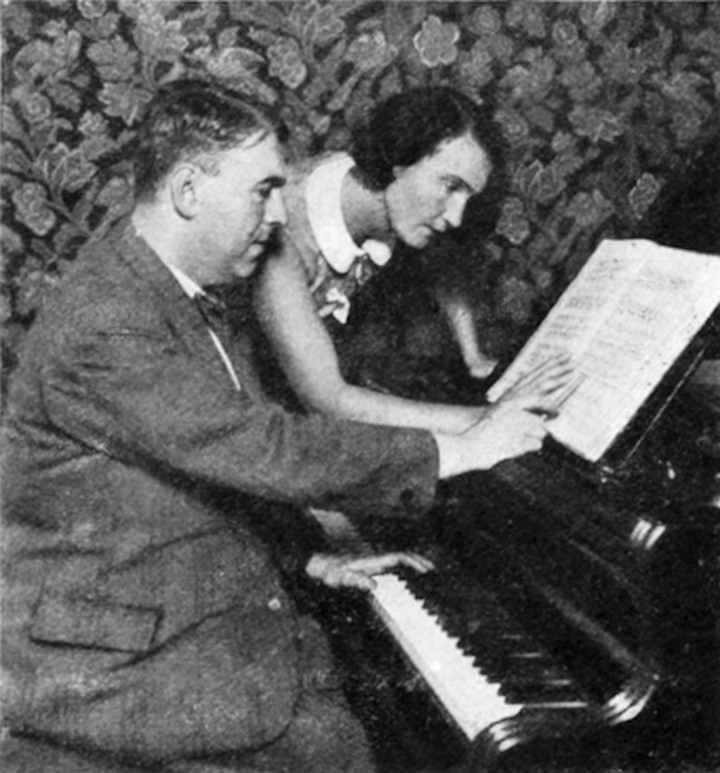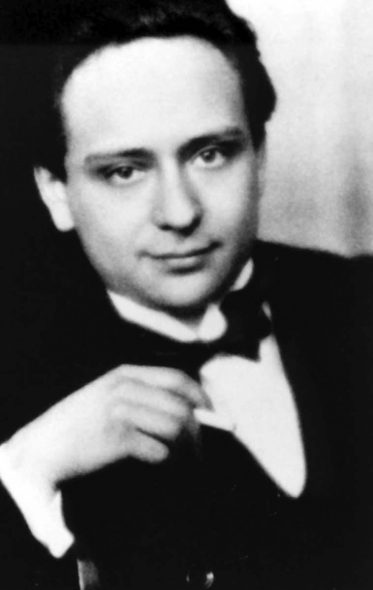Frankly Music Performs Jewish Composers Killed in Holocaust
Erwin Schulhoff and Viktor Ullmann wrote great music but their lives were cut short.

Composer Ervín Schulhoff (1894–1942) and dancer Milča Mayerová (1901-1977), ca 1931. (Public Domain).
Frankly Music opens its 2025-26 season with two concerts associated with the community-wide Violins of Hope collaboration. The first concert, Voices Unforgotten, reintroduces two Eastern European composers who died in German captivity.
Frank Almond will be joined next Sunday evening by violinist Eric Gratz, violist Anthony Devroye, cellist Alexander Hersh, and pianist Victor Santiago Asuncion.
Devroye performs with the Avalon String Quartet, is Artistic Director of Chicago’s summer Rush Hour concerts, and is a Professor of Viola at Northern Illinois University.
Asuncion has been a pianist for the Newel Piano Quartet and is a current member of the Delaware-based Serafin Ensemble. He is the Artistic Director and Founder of the Evanston Chamber Music Society and Chamber Music@Lauderdale by the Sea. He frequently appears and teaches at chamber music festivals.
Hersh returns to Frankly Music with a special title – 2025–26 Artist in Residence. Hersh has worked with Frank to develop the season programs and will play in several concerts. He serves as co-artistic directory of Nexus – a chamber group often performing at Guarneri Hall in downtown Chicago. Hersh has also developed entertaining music videos, such as this short story performed with an appearance by Asuncion.
Frankly Music joins in a community-wide coalition, the Violins of Hope-Wisconsin. The primary sponsors, the Milwaukee Youth Symphony Orchestra (MYSO), describe the initiative: “We are bringing the community a once-in-a-lifetime experience – to hear the stories of instruments owned and played by Jewish musicians and others targeted by the Nazis before and during the Holocaust, through educational and cultural programs and exhibits – to foster understanding.”
The community-wide Violins of Hope program has expanded to include more than 50 events from September through January.
Frankly Music will feature five little known composers over the two concerts beginning with Erwin Schulhoff and Viktor Ullmann.
Schulhoff (1894-1942) emerged as one of the most adventurous and stylistically diverse composers of the inter-war period, embodying the experimental spirit that flourished in Central Europe between the World Wars. Born in Prague, his subsequent musical education took him to Vienna, Leipzig, and Cologne, where he studied with such luminaries as Max Reger and Claude Debussy. After serving on the Western Front during World War I, Schulhoff returned with a transformed artistic vision that embraced “a variety of styles that flourished in a heady mélange between the wars, including Expressionism, Neoclassicism, Dada, American Jazz and South American dance,” as Earsense described it.
Schulhoff wrote his Duo for Violin and Cello, WV75 in 1925. The work showcases “an incredible array of techniques and devices investing this duo with far more color and dynamism than might, at first, seem possible,” Earsense noted, through extended use of pizzicato, harmonics, mutes, and extreme dynamic contrasts ranging from triple pianissimo to triple forte. Almond finds Schulhoff “such an inventive composer. (The Duo) is right up with the Ravel Duo” as a showcase for violin and cello.
Tragically, Schulhoff’s career was cut short when he was arrested by the Nazis and died of tuberculosis in the Wülzburg concentration camp in 1942, at age 48.
Ullmann (1898-1944) stands as one of the most significant composers of the Second Viennese School. He studied under Arnold Schoenberg and was recognized as a master of sophisticated twelve-tone technique. Working in Prague as a freelance musician and critic, he was deported to Theresienstadt in 1942. This concentration camp was reserved as a propaganda showcase by the Germans, allowing musicians a degree of freedom.
Ullman completed his String Quartet No. 3, Op. 46 while incarcerated in 1943. Blending contemporary sounds, folk music, and more traditional classical forms, the Quartet is not a twelve-tone work. Conductor Kenneth Woods observes, “The Third Quartet can in many ways be seen as a culmination of Ullmann’s development as a composer. In it one finds an exemplary balance of rigor and passion, a compelling formal logic, and a wealth of beautiful melodic writing.”
Ullman was later transferred to the concentration camp at Auschwitz-Birkenau, where he was killed in the gas chambers.
The concert closes with an established classic by Robert Schumann. Schumann’s gifts are on full display in his popular Piano Quartet in E-flat Major, Op. 47. The quartet was written in 1842 during his “year of chamber music” at the height of his creative powers.
Not as flamboyant as Schumann’s popular piano quintet, the tightly written piano quartet reflects careful study of Beethoven’s works. Music writer James Keller calls the main melody in the Andante cantabile one of Schumann’s most “sublime” creations, “perfect in its balance, soulfulness, and apparent simplicity… one of the magical Schumann moments in which the entire universe seems to hold its breath.” Kai Christensen observes that “Schumann ends this delicious quartet in a blaze of motion and rich counterpoint,” closing with “the drive and swelling complexity of fugal imitation for an exciting and deeply satisfying close.”
Almond is particularly proud of MYSO’s sponsorship of the Violins of Hope program. “Last summer, students went on a tour to Czechoslovakia and Poland. They went to Auschwitz one day.” In a Milwaukee preview of the Violins of Hope series, “all the violins were lined up and they were learning about the stories … and a couple of the kids got to play. Just to watch the kids’ faces,” I knew that “for some of them it’s going to be a tectonic event.”
Frankly Music opens its season at the Milwaukee Youth Arts Center, 325 W. Walnut St. near downtown Milwaukee. The Sunday concert begins at 7:00 p.m. Tickets may be purchased online or at the door. The musicians perform in an intimate room with the appearance of a gymnasium. But the acoustics and the audience proximity contribute to an outstanding experience.
The next concert, Ashes and Echoes, on Wednesday evening, October 29, also at the Arts Center, extends the Violins of Hope theme with three 20th-Century works by Pavel Haas, Gideon Klein, and Ernst Toch.
If you think stories like this are important, become a member of Urban Milwaukee and help support real, independent journalism. Plus you get some cool added benefits.
Preview
-
A Sacred Choir, 70 Voices Strong
 Dec 14th, 2025 by Martha Brown
Dec 14th, 2025 by Martha Brown
-
Prometheus Trio Goes Bohemian
 Dec 3rd, 2025 by Martha Brown
Dec 3rd, 2025 by Martha Brown
-
Present Music Offers New Choral Works
 Nov 20th, 2025 by Michael Barndt
Nov 20th, 2025 by Michael Barndt




















